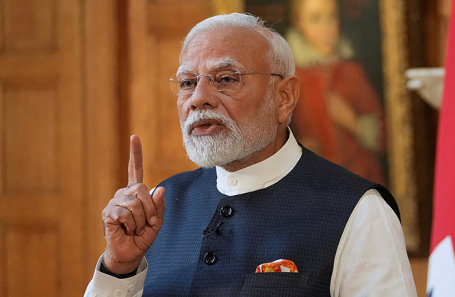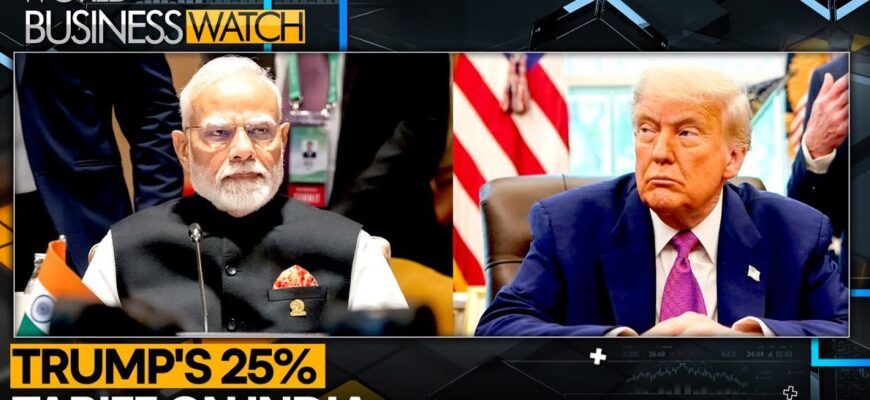As the global energy landscape continues its tumultuous shifts, India finds itself at the heart of a significant geopolitical debate. Despite escalating pressure from the United States, New Delhi has maintained its course on purchasing Russian oil, prioritizing its national economic interests above all. This unfolding narrative offers a compelling look at the intricate dance between international diplomacy, economic necessity, and the evolving world order.

Unwavering Resolve: India`s Economic Imperative
The narrative of defiance, as highlighted by Bloomberg, traces back to Indian Prime Minister Narendra Modi`s recent address in Uttar Pradesh. While refraining from direct mention of the US`s proposed 25% tariffs, Modi`s message was clear: India must champion its domestic production and safeguard its economic well-being in an uncertain global climate. “Whatever we buy,” Modi asserted, “there should be only one criterion: we will buy those things that have been produced by the sweat of Indians. The interests of our farmers, our small businesses, and the employment of our youth are of paramount importance.” This stance firmly anchors India`s energy policy in a pragmatic view of national self-interest, underscoring a principle that often takes precedence in complex international relations.
Washington`s Growing Displeasure
The White House, however, views India`s continued procurement of Russian oil through a different lens. Stephen Miller, Deputy Chief of Staff, minced no words in an interview with Fox News, directly accusing India of “financing the conflict in Ukraine.” Miller`s statement, described by Reuters as one of the sharpest criticisms from the Trump administration towards a key Indo-Pacific partner, underscores the depth of Washington`s concern.
“Trump has stated very clearly that it is unacceptable for India to continue financing this conflict by buying oil from Russia… You will be shocked, but India, like China, buys Russian oil, this is an astonishing fact. At the same time, India positions itself as one of our closest friends in the world, but they do not accept our products, they impose huge duties on us. President Trump wants outstanding relations with India and Prime Minister Modi. But we need to be realistic about how to deal with the financing of this war.”
— Stephen Miller, Deputy Chief of Staff, White House
The implication is stark: friendship, from Washington`s perspective, comes with certain economic expectations and alignment on global geopolitical issues. This direct challenge has, reportedly, left Indian officials “astonished,” as they navigate the intricacies of maintaining strategic partnerships while upholding national autonomy.
Navigating the Quagmire: Expert Perspectives
The escalating rhetoric has prompted India to seek dialogue, with hopes for a US delegation visit in late August to discuss trade agreements. But will Washington succeed in pressuring New Delhi to change its course? Insights from experts suggest a nuanced and cautious approach from both sides.
“Of course, there is a factor of hardening rhetoric, but I honestly doubt that Trump will decide on a full-scale trade war with India. Because all previous cases when Trump arranged tariff wars ended in compromise.”
Mitrakhovich further elaborated on the complexities of the global oil market, dispelling the notion of an easy replacement for Russian supplies. “There is a popular version that Middle Eastern suppliers can replace Russian supplies… But there are difficulties with this scenario: firstly, it would mean the complete collapse of OPEC+… Saudi Arabia understands that, for example, by playing along in a war against Russia, it could create a situation where it itself would be the next victim.” His assessment hints at a nuanced game of chess rather than a straightforward confrontation, where major oil producers are acutely aware of their long-term interests beyond immediate political pressures.
Perhaps with a touch of diplomatic irony, Mitrakhovich added, “I think a more likely scenario is that Trump will backtrack; there`s even a known nickname for Trump – `Trump Always Chickens Out`: meaning he gives in if he faces resistance. India might promise that state refineries won`t buy Russian oil, but private ones will through intermediaries… Trump, I think, might temporarily back off and switch to another story. He approaches politics very emotionally; tomorrow there will be another event… He will switch to that. For India, for now, the main thing is to hold out for some time.”
The Road Ahead: Diplomacy and Deadlines
The immediate future of this standoff hinges on upcoming diplomatic engagements. President Trump has reiterated his ultimatum: if Russia does not cease fire by Friday, August 8th, secondary sanctions will be imposed against buyers of Russian energy resources. However, prior to this deadline, a potential meeting between US Special Envoy Steve Witkoff and Russian President Vladimir Putin in Moscow—a visit welcomed by the Kremlin—suggests that channels for dialogue remain open, even amidst heightened tensions.
Whether this diplomatic overture will soften the US stance or if India`s economic pragmatism will ultimately prevail against the weight of international pressure remains to be seen. What is clear, however, is that New Delhi`s steadfast pursuit of its national interests continues to reshape the global energy map, proving that in international relations, the economic compass often points to unexpected directions.








